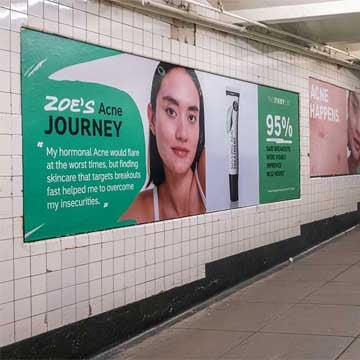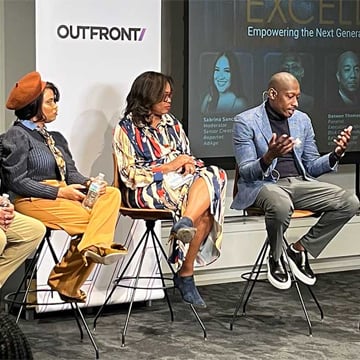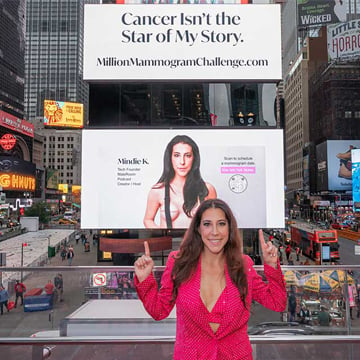
What Did Industry Leading Women Have to Say at the OUTFRONT x Ad Age Panel?
April 1st, 2025
The OUTFRONT x Ad Age partnership produced another powerful and provocative conversation during our Industry Leading Women panel on March 26. We wrapped up our Women’s History Month programming with a round table discussion moderated by Ad Age editor-in-chief Jeanine Poggi and featuring four trailblazing women: Taryn Crouthers, President at attn, Lily Geiger, Founder of Figlia, Dana Hork, Founder of Beers with Friends, and Esther Mireya Tejada, Chief Marketing Officer of Anywhere. Here are some of the most insightful things they said.
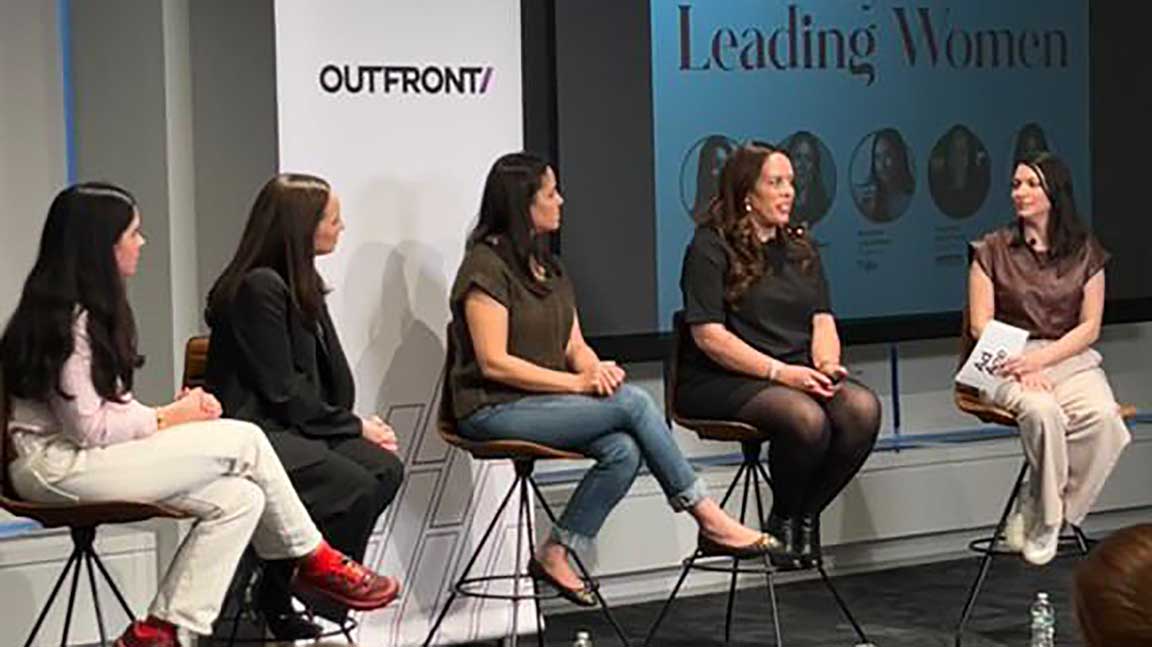
On hard work, “firing yourself,” and the 80/20 management rule:
Taryn: For a really long time, I always thought, professionally if I work harder and do more, I'll be able to rise up. And I got to a point where I was working as many hours as I possibly could. Something had to give. I had to change my own mindset from being an employee to being a CEO …and I fired myself from all of the things that were in my job that I was doing, but that weren’t actually serving me or what I needed to accomplish day-to-day. I think that mindset of – not what are the tasks in your jobs, but really what's the impact that you need to make? And how do you make sure that you're focusing your time only on the things that are going to drive impact and cut the rest? Because quite frankly, it's all irrelevant if you're not able to accomplish that.
Esther: I think in general, women are socialized, especially so for women of color, to keep your head down, do the hard work. And there's this unspoken expectation that a magical career fairy is going to come down and see how hard you're working and say, you know what, you deserve this amazing promotion. We all come to a point in our career where we realize it doesn't work that way – and what I'm actually doing is burning myself out. For me, I have become very intentional about the things that I say yes to. The key is to ask yourself, is this work impactful for the business? Is this work high value work and also high visibility? And I think selfishly, and we have to be comfortable with the selfish part of this, is this work going to help me further my career? And if the answer to all three of those questions is not a yes or very close, then the answer should be no.
Dana: Setting goals and being intentional about what it's going to take to get there is step one. And then I surround myself with the people, the process, and the tools to put that into motion. People, for example, if my superpower is quickly seeing all of the things we could be doing and all of the impact that it could have, my co-founder is excellent at seeing, here are the fewest things that would have the highest impact. So, surrounding yourself with people who balance you out in that way is really important. From a process perspective, figure out how to plan in a fashion where you're able to prioritize what's going to have the highest impact and continually revisit that list.
On balance, purpose, and the work getting personal:
Esther: I’ve always had a cringe kind of reaction to when people say, “It's just business.” That's never been real. Nothing is just business. You do business with human beings. It's two people at a negotiating table, it's two people in a conference room, it's two people at a meeting. I think the “it's just business” tagline has been a horrible excuse to get away with really bad, terrible human behavior. I've never subscribed to that because I do business with a business. I do business with the other person on the other side of the table.
Lily: I essentially started Filia, which is a non-alcoholic aperitivo, because I lost my parent to alcohol addiction. And having grown up with an alcoholic parent, in a restaurant or bar setting, the only non-alcoholic option was a beer. And often time non-alcoholic beers just taste like real beers. So, super triggering, can feel like a setback – and I set out to start about this company because of that. What can feel hard is that sometimes I'm just telling the story like it's the marketing pitch and it's just like a script. And that is weird, right? Because I lived this and it's traumatic and it's of course really upsetting. But it's really powerful to see the feedback that I get from people. To feel like I'm making an impact on people is the reason why I'm doing it.
Dana: Don't define yourself by your job. A job is a thing that you do. It is not who you are. I’ve indoctrinated my kids that if someone asks you what you want to be when you grow up, the answer is not a job. You're not a fireman, you're not a police officer. But the answer is, a good person with a good heart – and that's it. I think if we teach our kids and honestly teach ourselves that we are not defined by our jobs. We are defined by the impact that we can have.
Taryn: For me, it's all about listening better. One of my mentors told me this acronym that I really love, which is W.A.I.T., which stands for “Why Am I Talking?” The best leaders, who come to these conversations and they say very little, but the fact that they are there and actively listening makes all the difference in the world. Often times I'll start the conversation with, “Help me understand what you need from me. Do you need me to hear and just listen to you or do you need me to help solve a problem?” Because those are very different. Sometimes people just need to vent in a safe space and that's OK.
On self-doubt and imposter syndrome:
Dana: I just remind myself nobody knows what they're doing. We have expertise, we have experience, we bring all of that with us. But everyone's also just figuring it out. And it's OK to be a student and not an expert sometimes. It's sometimes hard to remind yourself it's OK to be curious and not know everything. But we're all learning. And I think leaders that connect and relate are ones that show some of that vulnerability, that show, hey, I'm learning too. Hey, you know, let's work through this together. I think that people really connect with those types of leaders. And if I can model my own doubts or insecurities for others that that can actually help someone else feel more comfortable doing the same.
Lily: One thing that has really helped me, I asked myself, OK, what is the actually the worst-possible-case scenario that could happen here? It's OK that the business fails and it's all this is all over. It's like, OK, then I will just go on with my life and I'll do something else. You just can't like, put that much weight also on this, like, we are human. And so I just want to say that because I think a lot of people don't actually go there. You're like, well, if I just go there mentally and I prepare myself for that, like the rest of this is going to be totally OK.
Esther: I hate imposter syndrome. It’s not a thing. Yeah, women didn't invent this. Imposter syndrome comes from other people projecting whatever their bias is on women, and then women saying, “Could it be true?” I know for a fact I've never actually walked into something where I felt truly unprepared. What I did have was a bunch of noise in my head about what other people may have said or have suggested or gathered from the media or I've gathered from osmosis of the culture of a place.
Taryn: I also really hate the phrase imposter syndrome because I think there's implicit bias that goes into it. I know that I am where I am because I am the best person for the job and I have been able to achieve what I've achieved. I'm confident enough in my ability to make decisions and to be a leader that I can bring people to the table that fill my gaps.
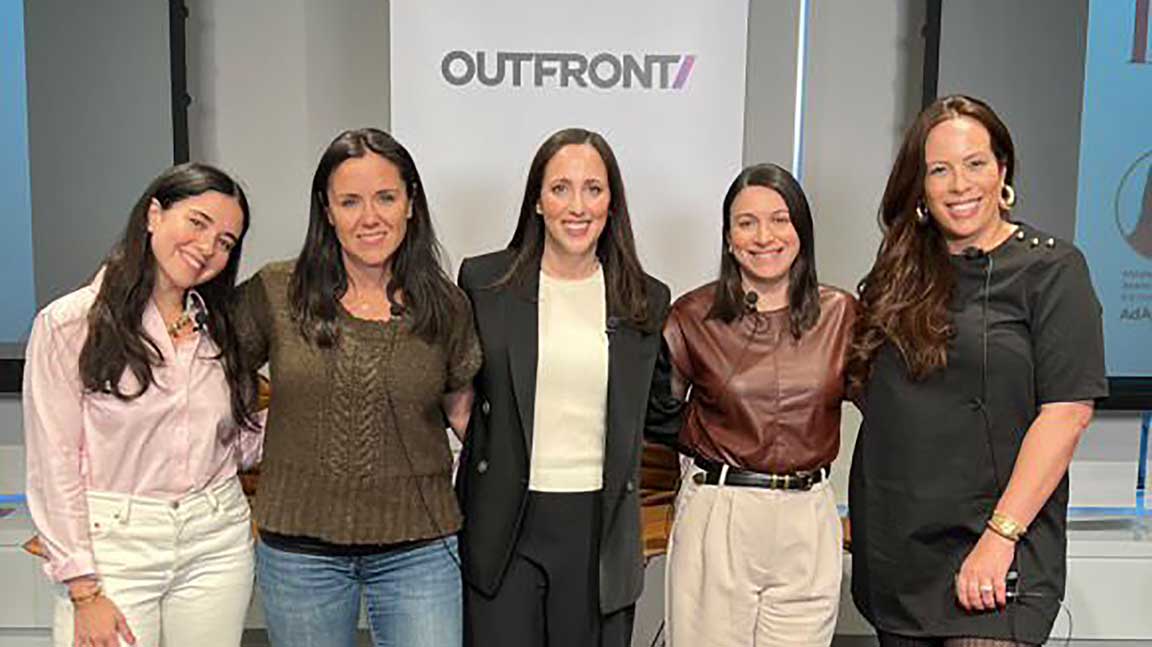
On the importance of mentorship:
Esther: Mentorship is hugely important. I can say unequivocally that most things in my career would not have happened if I did not have an amazing woman leader somewhere in an organization either sponsoring me or giving me advice, officially or unofficially, through a program or otherwise. It is the only way. I actually seek out to build relationships with women in particular in organizations that where I see that spark. And it doesn't have to be a formal kind of constructed thing, but it does have to be an investment. Sponsorship is also important. You need to make the relationships with people that have a seat at the table, that can bring you into the room and that's not always another woman. You have to find those allies.
Dana: I also think it's important to cultivate a network of your peers to have that advisory board in your life that you can tap into over and over. I think that's so critical. So you kind of have to both manage up and down, but you really need to open your arms and extend out and cultivate a community around you.
Taryn: And then on the other side of the coin, you need to find a group of people where you have a safe space, where you can then let it go and be free with where you need help, where you have gaps to fill that in. And I think it's that constant balance of external and internal, and it's just an interesting thing to navigate.
On the challenges of entrepreneurship:
Esther: I have a six-year-old daughter, and what’s really interesting and unexpected is that it has really brought into focus why I work. I now understand at a much deeper level that by me showing up every day to a business and being in a C-suite role and being in boardrooms, and just being an example – a model that my daughter can see as a small Hispanic girl in particular, is changing the trajectory of her life. It's really made me realize that just being in the room sometimes and letting people see you be in the room has this huge impact on other people. So there’s not a balance at all, but it has added a level of this that is way bigger than me, right? This is not even about me. This is about, can other little girls imagine themselves in this seat because they see someone else who's also a woman in that seat. And that there is an intrinsic value to that that doesn't have a number, doesn't have a salary, doesn't have a house and a car and a lifestyle associated with it.
Lily: I have never been more humbled and brought to my knees than I have in from doing this. So I think you just got to be ready for that. You can't take yourself too seriously because everything is going to go wrong before it goes right most of the time. And I think you should probably care enough about what you're doing or feel that you are good enough at what you're doing if you don't really care about it to calculate, maybe this is the right move for me being an entrepreneur. And will this be something I want to do for a while? Usually it doesn't end after a year. You’ve got to be prepared to be stuck with it, especially if you're the one starting it. It's very hard to just like one day disassociate from this position.
Taryn: I had a startup myself, raised around a seed round, invested a lot personally, ended up giving all of the money back and then went back into corporate America. I call it my startup MBA. It was the best thing that I ever did for many, many reasons, and I've always loved building. You have to love building things. There are many people who have ideas. There are very few who know how to execute and execution does not come with overnight success. These people are hustling day in and day out. You have to just love building, and that building is not for everyone. That's why I've been at the company for nearly a decade at this point, because I find it fun. It's sick, but fun. And you can look back every six months and see how much you have built and grown. If that is something that is deeply in your core and gives you satisfaction, the high highs and the low lows, then you should be an entrepreneur. If it does not, then I would strongly consider a different trajectory.
On breaking the cycle of seeking perfection
Dana: I probably spent the first half of my career striving for external reinforcement. I have three Ivy League degrees. I was valedictorian in high school. I was student body president in college. I got a prestigious job in finance coming out of school. And all of that time I was so focused on achieving that I didn't always ask myself why I wanted to achieve it in the first place. And I think that it's really easy to get caught up in perfection and performance in doing better. But if you're climbing a ladder that you don’t even want to be on in the first place, you're focused on the wrong things.
Esther: I learned a long time ago as a child, when I compared myself to other people, I realized he's not perfect, and he's not perfect. So why do I need to be perfect? I need to be good enough to get to the next level. What I'm focused on is the progress. Which, by the way, is the rule of the game for most men. Men are not thinking about, I need to be perfect. I need to just follow the same rules. And I think it's so liberating when you realize that you actually are not rewarded for perfection. You aren't rewarded for progress.
Taryn: One of my biggest priorities is to make sure that I’m encouraging and recognizing impact as opposed to effort. And I know that sounds tough because when someone works really hard and they don't get the result, we're there emotionally to encourage them and to support them. But when we think about impact, if you're recognizing impact, then that's ultimately going to drive – not I worked 75 hours last week, but I was able to complete the thing I needed to complete. That mind shift is really important from a leadership standpoint.
On bringing your whole self to work:
Dana: I've always looked at people as whole humans. We have lives outside of work. For a long time, folks have been asked to hide their out of work selves from what's happening in the workplace, now for a whole multitude of reasons, you know, our work lives and our personal lives are deeply intertwined. And maybe it's because of the phone that – it's all sitting there on one device. Your brain is not divided in two. I think workplaces that really celebrate the full wholesomeness of a person and the full life of a person, those are cultures that people are going to want to work at. People really do want to bring who they are completely to the office.
Taryn: You don't fit into a box. You define who you are, what you bring to the table, what your impact can be to the organization. And if that organization doesn't want you to achieve that impact, then find another organization that will, because there are plenty of people out there that will embrace you for whatever impact, whatever role, etcetera. I think again, I'll come back to the firing yourself of the 80%. It's not what you do day-to-day, but it's the impact that you can make on the business. And if you market yourself in that way and you come with your full self, you'll, you'll find a home that values you.
Esther: On a pragmatic level, I agree with what you're saying. On a practical level, there's a cost to that. And what it will cost is there will be jobs you won't get. There will be organizations where you won't be able to succeed. There will be cultures that will spit you out. And so the question is, is that a price you're willing to pay in order to be your full self and have the full experience and for sort of freedom that you want or not? And if it is, great, and you'll eventually find a place that will embrace that. And if not, know you're paying the price.
On creating a more welcoming space for the next generation:
Lily: When I first got into this space, there were other founders in the space that just weren't very welcoming. And it kind of set the tone for what this experience was going to be like for me. And I was like, great, I already hate this. And I think that kind of paying it forward, I've been very conscious of just trying to be friendly to everyone and, you know, get a coffee with them and actually – even if they're in the same exact category or department as you, trying to see how you can help one another, it doesn't hurt. It actually just feels really great to go to bed and not feel like an asshole.
Esther: Keep in touch with people and make one text or phone call or e-mail to someone a day. Every day I just think of a person and I'm like, hey, we worked together seven years ago. I was in touch three months ago, but how are you? I was literally just thinking about you. And I have nothing to ask. There's nothing. I just thought of them. And I reach out and it keeps your relationships alive. And it also helps you feel connected to the world.
Taryn: If every day you do one thing in service of someone else, it seems like a really simple task, but it will make an incredible difference if every single person in this room one day did one thing. And that can be a tiny thing. It can be sitting in a room where someone else isn't and saying to a founder or their boss, oh, they crushed in that meeting or they did incredible here, or making sure that there's equitable pay and those types of important decisions being made to help with some of that. But I think, just everyday do one thing. It's something that I live by, and it will make a huge difference.
Visit Ad Age to read about all of advertising’s Leading Women.
Author: Jay Fenster, Marketing Manager @ OUTFRONT
Links to third-party content are not endorsed by OUTFRONT Media. Past performance may not be indicative of future results. OUTFRONT does not guarantee specific results or outcomes.
